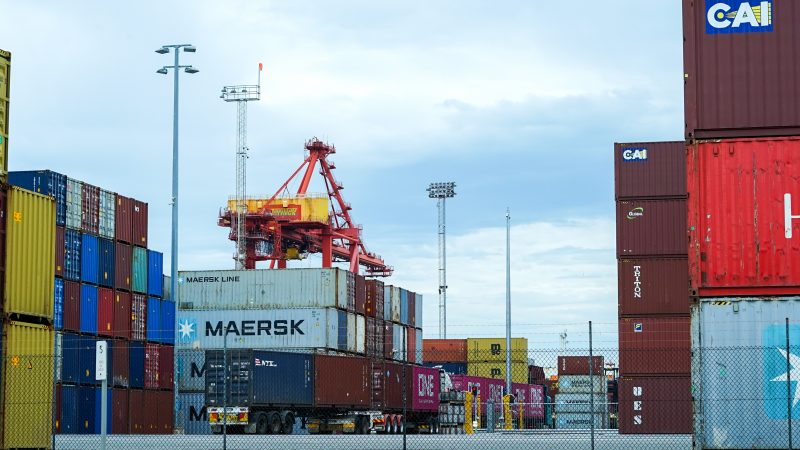
The Prime Minister has told the country that “the world has fundamentally changed”.
It follows, then, that the government must break with the same economic orthodoxy that has failed to deliver sustained growth or rising living standards in the UK.
The UK’s governing class often boasts that we have one of the most open economies in the world. But if globalisation really has come to an end, then we are left exposed.
The Bank of England recently remarked that “today, the UK remains an open economy that is highly integrated in the global trade and financial systems.” Total trade, the sum of imports and exports, is equivalent to over 60% of UK GDP, more than the average across major economies.
And the UK is an important international financial centre too. Its total foreign assets, and liabilities, are over five times larger than UK GDP.
Our economy is dangerously exposed
All this sounds boastful at the best of times. But as we hear that the global economy is being transformed before our eyes, our economy is dangerously exposed.
Trump’s tariffs are symbolic of the decline of globalisation and neoliberal policies that have dominated the world for decades. The uncertainty created by these tariffs is affecting markets worldwide and shaking business confidence. China’s retaliatory tariffs on the US show the emerging tension. The UK is caught in the middle of this turmoil.
READ MORE: List of councillors quitting over welfare amid further cuts
The UK’s political establishment has long championed globalisation as an irreversible force. Former Prime Minister Tony Blair’s 2005 Labour Party conference speech encapsulated this view, declaring ‘I hear people say we have to stop and debate globalisation. You might as well debate whether autumn should follow summer.’ For Blair there was nothing the British people could do about globalisation so we shouldn’t waste time debating it.
This elitist mindset, where decisions are made by a disconnected political class, contributed to the Brexit vote and, similarly, to the rise of Donald Trump in the US.
Austerity policies almost invariably lead to stagnation
Now, the UK is at a dangerous crossroads. Trump’s tariffs increase the cost of British exports to the US by 10%, worsening the UK’s already bleak economic outlook. Our industrial base has shrunk, our public finances are stretched thin and our infrastructure is in urgent need of an upgrade. The country is ill-prepared for the economic and financial turbulence ahead. Some economists are even predicting a global recession.
At the Spring Statement the Chancellor chose to double-down on austerity. It is said that her fiscal rules are designed to reassure the international markets. But reassurance to the markets threatens the material conditions of millions of people in the country. The estimated £4.8 billion in cuts to welfare, including for the disabled, is predicted to push 400,000 more people into poverty, including 100,000 children.
The Chancellor also confirmed further cuts to public investment and indicated more cuts to some departmental budgets at the spending review in June. This approach mirrors the Conservative government’s austerity measures after the 2008 financial crisis, despite the fact that fiscal contraction stunted growth by draining money from the economy.
The government has pledged to focus on economic growth. The Conservatives said the same. Yet their austerity policies almost invariably led to stagnation. I am extremely concerned that history is repeating itself.
Trump’s tariffs will make growth that much harder and may even lead to contraction. The government’s current fiscal policy is poorly equipped to face this challenge. The Chancellor’s self-imposed fiscal rules – which require debt to fall as a share of GDP by the end of this Parliament and forbid borrowing for day-to-day spending – severely limit her ability to respond effectively.
These rules were misguided even before the global situation worsened, and now they appear absurd. If, as the Prime Minister claims, the world has changed, then it stands to reason that the UK’s fiscal rules need to change too.
The current economic orthodoxy is clearly failing
However, loosening fiscal rules alone is not enough.
The UK’s economic institutions – the Bank of England, the Office for Budget Responsibility (OBR), the Treasury, and the City of London – all play key roles in maintaining the current economic orthodoxy, which is clearly failing.
For instance, the Bank of England has pursued policies of monetary tightening, keeping interest rates higher than necessary and pulling money out of the economy. These actions have forced the Chancellor to repay £100 billion to the Bank. This is money that could otherwise be used for public investment or economic growth. The Bank’s governor remains steadfast in this approach, seemingly oblivious to the long-term damage they are inflicting.
The OBR is also part of the problem. This supposedly independent body has a track record of making inaccurate forecasts, which the government uses to justify austerity measures. As the New Economics Foundation has pointed out, the OBR’s analysis often underestimates the economic multiplier effect, leading to flawed predictions about public debt and spending needs.
The Treasury, meanwhile, remains entrenched in a rigid economic orthodoxy that has repeatedly failed to deliver sustainable growth. Its approach to taxation, spending, and fiscal policy is rooted in neoliberal theories that prioritise austerity and financial stability over investment and growth.
This has created a damaging cycle of fiscal tightening, public sector cuts, and underinvestment, leaving the economy starved of the resources it needs to grow.
A radical rethinking of economic policy is necessary
At the root of these failures is the dominance of the financial sector in shaping policy. The UK’s financial system, valued at £27 trillion in 2022 – far greater than the country’s total annual output – is driven by the interests of the City of London. Financial institutions rely on economic stability, low interest rates, and tight fiscal controls to protect their assets. The Treasury, the Bank of England, and the OBR often act as their servants, prioritising the financial elite’s interests over those of ordinary citizens.
Now is the time to challenge economic orthodoxy. The finance sector worldwide is unstable. Austerity measures, which disproportionately affect the poorest, are not only morally indefensible but economically counterproductive. The poorest households are the most likely to spend their income, stimulating economic activity. Cutting their spending power only stifles growth.
The time has come for a fundamental shift in economic policy. The government cannot continue pursuing the same failed approach. What is needed is a new vision for the UK economy, one that prioritises social justice and isn’t afraid to pursue investment led growth.
The government must stop clinging to outdated rules and begin a radical rethinking of economic policy. This is the only way to prepare the UK for the challenges of a post-globalisation world and build a fairer, more prosperous future for all.
For more from LabourList, subscribe to our daily newsletter roundup of all things Labour – and follow us on Bluesky, WhatsApp, Threads, X or Facebook .
- SHARE: If you have anything to share that we should be looking into or publishing about this story – or any other topic involving Labour– contact us (strictly anonymously if you wish) at [email protected].
- SUBSCRIBE: Sign up to LabourList’s morning email here for the best briefing on everything Labour, every weekday morning.
- DONATE: If you value our work, please chip in a few pounds a week and become one of our supporters, helping sustain and expand our coverage.
- PARTNER: If you or your organisation might be interested in partnering with us on sponsored events or projects, email [email protected].
- ADVERTISE: If your organisation would like to advertise or run sponsored pieces on LabourList‘s daily newsletter or website, contact our exclusive ad partners Total Politics at [email protected].





More from LabourList
Antonia Romeo appointed to lead civil service as new Cabinet Secretary
‘If Labour is serious about upskilling Britain, it must mobilise local businesses’
Stella Tsantekidou column: ‘What are we to make of the Labour Together scandal?’